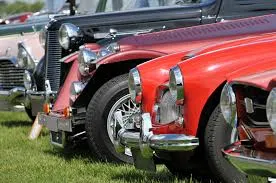Hidden Beauties of Rare Classic Cars

Rare classic cars are more than just vehicles; they are timeless works of art, symbols of innovation, and pieces of history. These iconic automobiles hold a special place in collectors, enthusiasts, and historians’ hearts. In this blog post, we’ll explore what makes these cars rare, their stories, and why they continue to captivate the automotive world.
What Defines a Rare Classic Car?
Not every old car is a classic, and not every classic is rare. A rare classic car is one with limited production numbers, unique features, or a significant historical impact. Factors such as exclusivity, custom designs, and celebrity ownership often make these cars highly sought-after.
Examples include the 1962 Ferrari 250 GTO, known for its elegant design and racing pedigree, and the Bugatti Type 57SC Atlantic, a masterpiece of pre-war engineering.
The Allure of Rare Classic Cars
Rare classic cars attract attention for several reasons:
- Timeless Design: These cars showcase unparalleled craftsmanship, often hand-built with meticulous attention to detail.
- Historical Significance: Each car tells a story, whether it’s a groundbreaking innovation or a memorable appearance in pop culture.
- Investment Value: The rarity and historical importance of these vehicles make them valuable assets, with some models fetching millions at auctions.
Iconic Rare Classic Cars Through the Ages

Here are some legendary models that have achieved cult status:
1. Mercedes-Benz 300SL Gullwing (1954-1957)
Famous for its upward-opening doors, the 300SL Gullwing was a revolutionary car with cutting-edge aerodynamics and a fuel-injected engine. It remains an icon of elegance and performance.
2. Shelby Cobra 427 (1965)
This American muscle car combined raw power with a sleek design. With fewer than 1,000 units produced, it’s a rare gem that collectors dream of owning.
3. Aston Martin DB5 (1963-1965)
Best known as James Bond’s ride in Goldfinger, the DB5 is synonymous with luxury and intrigue. Its limited production makes it highly desirable.
Preserving the Legacy
Owning a rare classic car comes with responsibility. Proper maintenance, restoration, and preservation are crucial to ensure these beauties retain their value and charm. Collectors often invest in climate-controlled garages, specialized mechanics, and even custom parts to keep these cars in pristine condition.
Why Rare Classic Cars Matter
Rare classic cars remind us of the evolution of automotive technology and design. They highlight a time when cars were built with passion, not just mass production. For enthusiasts, owning or admiring these vehicles is a way to connect with the past and appreciate the artistry of a bygone era.
Hidden Beauties of Rare Classic Cars

Rare classic cars are more than just vintage vehicles—they’re a glimpse into the past, capturing the essence of innovation, artistry, and craftsmanship. Each car tells a unique story, from its engineering marvels to its cultural impact. In this blog, we’ll dive deeper into what makes a vehicle rare, why collectors treasure it, and how they’ve shaped the history of the automotive world.
What Makes a Classic Car Rare?
Several factors contribute to the rarity of classic cars. These include:
- Limited Production: Models with small production runs, like the Lamborghini Miura SV, are rare because only a handful were made.
- Unique Features: Cars with innovative designs, special trims, or one-of-a-kind features, such as the gullwing doors of the Mercedes-Benz 300SL, stand out.
- Historical Importance: Vehicles that played a key role in automotive history, like the Ford Model T, are rare classics that revolutionized car manufacturing.
- Celebrity Ownership: Cars owned by icons, such as Elvis Presley’s Cadillac Fleetwood, often gain legendary status.
Why Collectors Value Rare Classic Cars
Rare classic cars hold a charm that modern vehicles struggle to replicate. Collectors are drawn to them for these reasons:
- Artistry: The hand-crafted designs and intricate details of classic cars are a testament to the artistry of their time.
- Cultural Significance: These cars often symbolize pivotal moments in history, whether they’re tied to World War II, the golden age of Hollywood, or groundbreaking technological advancements.
- Sound Investment: With values that often appreciate over time, rare classics are not just a passion but also a smart financial choice.
Stories Behind Legendary Rare Classic Cars

1. Ferrari 250 GTO (1962-1964)
Arguably the most valuable classic car ever made, the 250 GTO was designed for racing, with only 36 units produced. It embodies speed, elegance, and exclusivity.
2. Jaguar E-Type Series 1 (1961-1968)
Enzo Ferrari once called it “the most beautiful car ever made.” The E-Type set new standards in both design and performance.
3. Porsche 356 Speedster (1954-1959)
Loved for its minimalist design and spirited performance, this car symbolized luxury and freedom in post-war America.
Tips for Maintaining Rare Classic Cars
Owning a rare classic car is a privilege, but it comes with responsibilities. Here’s how collectors keep their treasures in top condition:
- Storage: Use climate-controlled garages to protect against temperature changes and humidity.
- Regular Maintenance: Work with mechanics who specialize in vintage vehicles to ensure proper care.
- Documentation: Keep a detailed history of the car’s maintenance, ownership, and restoration work.
- Original Parts: Whenever possible, use authentic parts to preserve the car’s originality and value.
The Future of Rare Classic Cars
As sustainability becomes a focus, there’s a growing market for restoring classic cars with electric powertrains. This blend of old-world charm and modern technology ensures these cars remain relevant and cherished for generations to come.
FAQs About Rare Classic Cars
Q1: What is the rarest classic car in the world?
The Bugatti Type 57SC Atlantic is often considered one of the rarest classic cars, with only two surviving models in existence.
Q2: Are rare classic cars a good investment?
Yes, many rare classics appreciate value over time, making them both a passion project and a financial asset.
Q3: How do I determine the value of a rare classic car?
Factors like the car’s condition, originality, production numbers, and historical significance all play a role. Consult experts or appraisers for accurate valuation.
Q4: Can I convert a rare classic car to an electric vehicle?
Yes, some companies specialize in EV conversions for classic cars. However, this can affect the vehicle’s originality and value.
Q5: What is the best way to find rare classic cars for sale?
Check classic car auctions, specialty dealerships, and online platforms dedicated to vintage cars. Networking with collectors can also help.
Conclusion
Rare classic cars are hidden beauties that continue to inspire and amaze. Whether you’re a collector, an enthusiast, or simply someone who appreciates history and design, these timeless treasures offer a glimpse into the golden age of automobiles.


